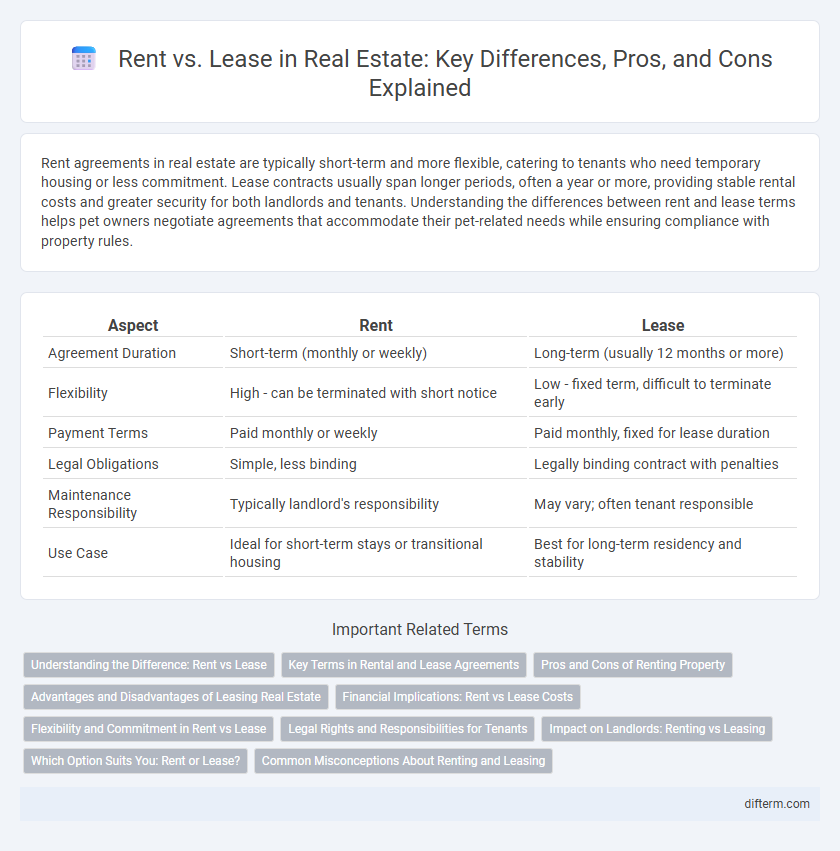Rent agreements in real estate are typically short-term and more flexible, catering to tenants who need temporary housing or less commitment. Lease contracts usually span longer periods, often a year or more, providing stable rental costs and greater security for both landlords and tenants. Understanding the differences between rent and lease terms helps pet owners negotiate agreements that accommodate their pet-related needs while ensuring compliance with property rules.
Table of Comparison
| Aspect | Rent | Lease |
|---|---|---|
| Agreement Duration | Short-term (monthly or weekly) | Long-term (usually 12 months or more) |
| Flexibility | High - can be terminated with short notice | Low - fixed term, difficult to terminate early |
| Payment Terms | Paid monthly or weekly | Paid monthly, fixed for lease duration |
| Legal Obligations | Simple, less binding | Legally binding contract with penalties |
| Maintenance Responsibility | Typically landlord's responsibility | May vary; often tenant responsible |
| Use Case | Ideal for short-term stays or transitional housing | Best for long-term residency and stability |
Understanding the Difference: Rent vs Lease
Rent refers to a short-term agreement, typically month-to-month, allowing flexibility for both landlord and tenant with adjustable terms and pricing. Lease involves a long-term contract, usually six months to a year or more, providing stability with fixed terms and rental rates. Understanding the distinction between rent and lease helps tenants and landlords determine commitment levels, legal obligations, and financial expectations in property agreements.
Key Terms in Rental and Lease Agreements
Rental agreements typically involve shorter terms, often month-to-month, offering more flexibility with rent adjustments and notice periods, while lease agreements usually span fixed durations, commonly 6 to 12 months, providing stable rent amounts and defined obligations. Key terms in both contracts include rent amount, payment due dates, security deposit details, maintenance responsibilities, and termination conditions, with leases often containing more detailed clauses regarding property use and renewal options. Understanding these distinctions ensures tenants and landlords negotiate clear expectations, reducing disputes and legal complications.
Pros and Cons of Renting Property
Renting property offers flexibility and lower upfront costs, making it ideal for short-term housing or uncertain commitments. However, renters face limitations such as lack of property control, potential rent increases, and no equity buildup. The ease of moving contrasts with less stability compared to leasing, which typically offers fixed terms and more control over the property.
Advantages and Disadvantages of Leasing Real Estate
Leasing real estate offers advantages such as predictable monthly payments, lower upfront costs compared to purchasing, and flexibility to relocate after the lease term ends. However, disadvantages include limited control over property modifications, potential restrictions on use, and no equity buildup despite regular payments. Long-term leases can also result in higher overall costs than renting short-term or purchasing outright.
Financial Implications: Rent vs Lease Costs
Renting typically involves lower upfront costs and more flexibility, making it ideal for short-term housing needs or uncertain financial situations. Leasing agreements often require a longer commitment with fixed monthly payments that can provide budget stability, but may include additional fees such as security deposits and maintenance costs. Understanding the total financial implications, including potential rent increases and early termination penalties, is crucial for effective real estate budgeting.
Flexibility and Commitment in Rent vs Lease
Rent agreements typically offer greater flexibility with shorter terms, allowing tenants to adjust their living situation or relocate with minimal notice. Lease contracts require a fixed commitment for a specified duration, often six months to a year, which ensures stable occupancy but limits tenant mobility. Choosing between rent and lease depends on balancing the need for flexibility against the desire for long-term housing security.
Legal Rights and Responsibilities for Tenants
Tenants in a rental agreement typically hold more flexible rights with shorter notice periods and fewer long-term obligations compared to leaseholders who are bound by a legally enforceable contract for a fixed term, often 12 months or more. Lease agreements generally provide stronger tenant protections against rent increases and eviction, while rental agreements may allow landlords to change terms with proper notice. Understanding the specific statutory tenant rights and landlord responsibilities under local jurisdiction in a lease versus rent context is crucial for maintaining legal compliance and securing housing stability.
Impact on Landlords: Renting vs Leasing
Landlords benefit from renting with shorter rental terms, allowing flexibility in adjusting rent prices based on market demand and tenant performance. Leasing provides landlords with stable, long-term income and reduced turnover, minimizing vacancy risks and administrative costs. Understanding the impact of rent versus lease agreements helps landlords optimize property income and manage tenant relationships effectively.
Which Option Suits You: Rent or Lease?
Choosing between renting and leasing depends on your long-term plans and financial flexibility; renting offers short-term convenience with fewer commitments, while leasing provides stability with fixed terms and often lower monthly costs. Rent agreements typically last month-to-month, ideal for those who anticipate changes in living situations, whereas leases usually span 6 to 12 months, ensuring consistent housing costs. Assess your lifestyle needs, budget constraints, and expectations for property control to determine whether rent or lease aligns best with your real estate goals.
Common Misconceptions About Renting and Leasing
Many individuals mistakenly believe that renting and leasing are identical, but renting generally involves shorter, more flexible terms while leasing commits both parties to a fixed contract for a longer duration, typically six months to a year. Another common misconception is that leases cannot be terminated early without penalties, yet some lease agreements include early termination clauses or negotiation options. Understanding these distinctions helps tenants avoid unforeseen costs and legal obligations in residential or commercial real estate agreements.
Rent vs Lease Infographic

 difterm.com
difterm.com